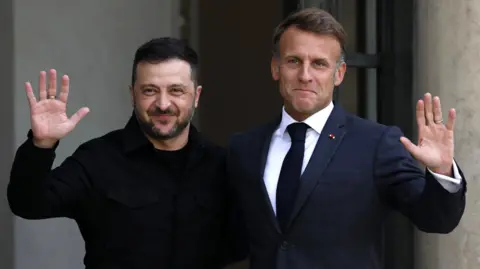Macron says 26 countries ready to send troops for Ukraine ceasefire
2 hours agoPaul KirbyEurope digital editor

 Getty Images
Getty ImagesTwenty-six Western allies have formally committed to deploying troops “by land, sea or air” to Ukraine the day after a ceasefire deal is agreed, Emmanuel Macron has said.
Speaking after a summit of 35 countries dubbed the “Coalition of the Willing”, the French president accused Russia of trying to delay the peace process to buy more time to seize more Ukrainian territory.
Hopes of a Ukraine-Russia summit to end the fighting have receded since Russia’s Vladimir Putin met Donald Trump in Alaska last month.
Trump spoke to the Western allies over the phone on Thursday, and Macron said US support would be finalised in the coming days.
However, the US president was also critical of EU countries that continued to buy Russian oil, Ukraine’s Volodymyr Zelensky told reporters.
The 27-member European Union has set a target of ending all gas and oil imports by the end of 2027. Hungary and Slovakia, whose leaders are seen as close to Russia, are among the EU’s biggest importers of Russian oil.
Few countries have openly promised to deploy troops on the ground in Ukraine in the event of a deal, and the US has already ruled such a move out. European diplomats have suggested that committing troops at this point would probably help Putin’s narrative against the West.
Moscow has made clear that no Western forces should be deployed to Ukraine and has insisted that it should be one of the countries acting as “guarantors” – an idea rejected by Kyiv and its allies.
The French president said he had “no doubt” of US willingness to be part of security guarantees for Ukraine.
Trump recently indicated that US backing could come “probably” in the form of air support. Details so far are vague, but air support could include help with air defence or intelligence.
Russia continues to send troops into Ukraine despite the latest attempts to set ceasefire talks, Macron complained.
In the latest violence, two people clearing mines were killed in a Russian attack in northern Ukraine.
UK Prime Minister Sir Keir Starmer said Western allies now had an “unbreakable pledge” to Ukraine, backed by the US, and had to press Russia to end the war, according to a Downing Street spokeswoman.
Sir Keir, who co-chaired the Paris summit remotely, said Putin could not be trusted.
Ukraine and its allies believe a ceasefire should be agreed before any attempt at securing a broader peace deal, although Russia disagrees.
German Chancellor Friedrich Merz said following the meeting that the first priority was to secure a ceasefire at a summit involving Ukraine’s Volodymyr Zelensky, and then provide “strong security guarantees”.
Zelensky’s top officials held talks in Paris with US special envoy Steve Witkoff on Thursday.
More than three-and-a-half years after Russia’s full-scale invasion of Ukraine, Putin said this week there was “a certain light at the end of the tunnel” and that “there are options for ensuring Ukraine’s security in the event the conflict ends”.
The prospect of a direct meeting involving Putin and Zelensky has become increasingly unlikely since it was suggested last month by President Trump.
Putin suggested this week Zelensky could come to Moscow for talks, an idea branded “unacceptable” by Kyiv. The Ukrainian leader said it was indication Russia did not really want the meeting to take place.
Nato chief Mark Rutte said on Thursday that Russia had no veto on Western troops being deployed to Ukraine: “Why are we interested in what Russia thinks about troops in Ukraine? It’s a sovereign country. It’s not for them to decide.”
Trump told CBS News on Wednesday that he remained committed to reaching a deal to end the war and said he continued to have a good relationship with both Putin and Zelensky.
“I think we’re going to get it all straightened out,” he said.
UK Defence Secretary John Healey has praised Trump, who he says “brought Putin into talks” and “not closed off any options”.
The Russian leader, who spent Wednesday with China’s Xi Jinping and North Korean leader Kim Jong Un, claims that his country’s military is pushing forward on all fronts in Ukraine.
He warned that without a deal Moscow was prepared to “resolve all our tasks militarily”.
Russia has rejected the idea of an initial ceasefire, insisting its campaign will not end before a full peace deal.
A source at the Élysée Palace suggested ahead of Thursday’s talks that there were several historical examples of ceasefires that had lasted without a full peace agreement.
The source pointed to the demarcation line between North and South Korea, where a ceasefire had lasted for years with a powerfully armed, allied American deployment serving as a signal to North Korea. That concept was extremely important for the Ukrainians, the source added.